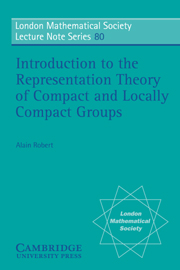Summary
The following analogue of the Peter-Weyl theorem (p.29) has not been proved.
Gelfand-Raikov theorem. For any locally compact group G and any x ≠ e ∈ G, there is an irreducible unitary representation π ∈ Ĝ such that π(x) ≠ id.
However, this theorem follows easily from the deeper results (20.10) or (21.12) applied to the (bi-)regular representation of G. They show that one can even take π in the reduced dual Ĝred.
(For details, cf. Dixmier 1964 or Gaal 1973.)
On the other hand, our introduction of type I groups has been made in an ad hoc way. A proof that a certain class of groups (semi-simple real or p-adic algebraic groups) is of type I is not trivial and usually follows the following pattern.
Information
- Type
- Chapter
- Information
- Publisher: Cambridge University PressPrint publication year: 1983
